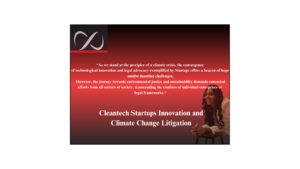
In the ongoing crusade against climate change, the start-up emerges as a trailblazer, navigating the intricate nexus of cleantech innovation and legal advocacy to champion environmental stewardship. Embarking on its quest in 2017, the start-up’s trajectory embodies the symbiotic relationship between technological innovation and legal resilience, offering a blueprint for confronting the legal complexities inherent in climate change litigation.
The start-up‘s Odyssey: From Technological Innovator to Legal Vanguard
The start-up’s genesis as a cleantech startup marked the genesis of its dual identity as both innovator and advocate. As the start-up’s technological prowess burgeoned, so too did its recognition of the imperative to confront legal hurdles hindering the advancement of cleantech solutions. Thus, the start-up embarked on a transformative journey, transcending the confines of traditional entrepreneurship to embrace the mantle of legal stewardship.
Championing Legal Innovation in Climate Change Litigation
At the heart of the start-up’s legal odyssey lie the twin pillars of legal innovation and strategic acumen, enabling the company to surmount formidable legal challenges and catalyze systemic change in the realm of environmental law.
Challenge 1: Navigating Regulatory Labyrinths
The labyrinthine landscape of environmental regulations posed a formidable obstacle to the start-up’s mission, requiring a nuanced understanding of legal frameworks and strategic navigation of regulatory landscapes.
Solution: the start-up’s approach to regulatory challenges encompassed:
- Regulatory Compliance Teams: the start-up assembled interdisciplinary teams comprising legal experts, environmental scientists, and regulatory analysts to navigate the intricacies of environmental law, ensuring compliance with regulatory mandates while maximizing cleantech innovation.
- Policy Advocacy Initiatives: Through targeted advocacy campaigns and coalition-building efforts, the start-up advocated for legislative reforms aimed at streamlining regulatory processes, enhancing transparency, and fostering innovation in the cleantech sector.
Challenge 2: Overcoming Financial Barriers to Legal Access
The exorbitant costs associated with litigation posed a significant barrier to legal access for the start-up and other prospective plaintiffs, necessitating innovative approaches to democratize legal representation.
Solution: the start-up spearheaded initiatives to democratize legal access, including:
- Litigation Funding: Partnering with impact investors and philanthropic organizations, the start-up established litigation funding mechanisms to underwrite legal costs for grassroots organizations and marginalized communities engaged in climate change litigation.
- Pro Bono Networks: Cultivating networks of pro bono legal practitioners, the start-up facilitated the provision of free legal representation to underserved communities, ensuring equitable access to justice in environmental litigation.
Forging Legal-Technological Synergies: Leveraging Cleantech Solutions
In the realm of environmental advocacy, the start-up stands as a beacon of innovation, seamlessly integrating cleantech solutions into its legal arsenal to address pressing environmental challenges. This convergence of technological ingenuity and legal resilience underscores the transformative potential of leveraging cleantech in the pursuit of environmental justice.
Evidence-Based Advocacy: the start-up has been at the forefront of pioneering the use of advanced technologies to gather and analyze empirical data, enhancing the credibility and impact of its legal arguments. By harnessing geospatial data analytics, remote sensing technologies, and machine learning algorithms, the start-up has compiled robust evidence of environmental harm. This evidence-based approach not only strengthens the start-up’s legal cases but also serves as a powerful tool for raising awareness and advocating for policy change. Through the meticulous analysis of environmental data, the start-up brings to light the real-world consequences of pollution and ecological degradation, compelling stakeholders to take action.
Blockchain Authentication: Recognizing the importance of data integrity and transparency in legal proceedings, the start-up has implemented blockchain-based authentication systems to safeguard environmental data. Blockchain technology, renowned for its immutable and decentralized nature, provides an ideal solution for verifying the authenticity of environmental data. By recording environmental observations and measurements on a blockchain ledger, the start-up ensures that this information remains tamper-proof and verifiable. This not only enhances the credibility of the start-up’s legal arguments but also instills trust in stakeholders, including courts, regulatory bodies, and the general public. With blockchain authentication, the start-up establishes a solid foundation of trust and reliability, laying the groundwork for effective legal advocacy in the realm of environmental protection.
Strategic Partnerships: In addition to its technological innovations, the start-up has forged strategic partnerships with leading cleantech firms, research institutions, and environmental organizations. These collaborations enable the start-up to access cutting-edge technologies, expertise, and resources, amplifying its impact in the legal and environmental spheres. By fostering an ecosystem of collaboration and knowledge-sharing, the start-up expands its capacity to tackle complex environmental challenges and drive meaningful change. Through strategic partnerships, the start-up leverages the collective expertise and resources of its network to advocate for sustainable solutions and hold polluters accountable.
Community Engagement: the start-up recognizes the importance of community engagement in advancing its environmental advocacy efforts. Through outreach programs, educational initiatives, and grassroots organizing, the start-up empowers local communities to become active participants in the fight against environmental degradation. By fostering a sense of environmental stewardship and collective responsibility, the start-up builds a robust support network that amplifies its legal and technological interventions. Community engagement not only strengthens the start-up’s impact on the ground but also fosters long-term partnerships and alliances with those directly affected by environmental issues.
Policy Advocacy: Leveraging its technological capabilities and legal expertise, the start-up actively engages in policy advocacy to drive systemic change at the legislative and regulatory levels. By analyzing data trends, identifying regulatory gaps, and advocating for evidence-based policies, the start-up influences decision-makers to enact laws and regulations that prioritize environmental protection. Through targeted advocacy campaigns and coalition building, the start-up amplifies its voice and catalyzes meaningful policy reform. By shaping the legal and regulatory landscape, the start-up lays the groundwork for a more sustainable and equitable future for generations to come.
In essence, the start-up’s integration of cleantech solutions into its legal strategies exemplifies the power of innovation and collaboration in addressing complex environmental challenges. By harnessing the synergies between technology and law, the start-up advances its mission of environmental stewardship and advocacy, paving the way for a more sustainable and resilient future.
Expanding the Legal Frontiers: Four Additional Points
- Community Empowerment Initiatives: the start-up initiated community empowerment programs, equipping grassroots activists and environmental advocates with legal literacy and advocacy skills to engage effectively in climate change litigation.
- International Collaboration: the start-up forged strategic partnerships with international legal organizations and environmental advocacy groups, fostering cross-border collaboration and knowledge exchange to address transnational environmental challenges.
- Corporate Accountability Campaigns: the start-up spearheaded corporate accountability campaigns targeting polluting industries, leveraging legal mechanisms such as shareholder activism, consumer litigation, and corporate social responsibility initiatives to hold corporations accountable for environmental harm.
- Policy Innovation Platforms: the start-up established policy innovation platforms to catalyze dialogue between policymakers, industry stakeholders, and civil society organizations, fostering the co-creation of regulatory frameworks conducive to cleantech innovation and environmental sustainability.
Conclusion: A Call to Collective Action
In conclusion, the start-up’s pioneering endeavors underscore the imperative for collective action in confronting the existential threat of climate change. As we stand at the precipice of a climate crisis, the convergence of technological innovation and legal advocacy exemplified by the start-up offers a beacon of hope amidst daunting challenges. However, the journey towards environmental justice and sustainability demands concerted efforts from all sectors of society, transcending the confines of individual enterprises or legal frameworks.
As the start-up continues to chart new frontiers in cleantech innovation and climate change litigation, it beckons us to embark on a collective voyage towards a sustainable future. By harnessing the transformative power of technology, bolstered by legal resilience and societal collaboration, we can navigate the turbulent seas of climate change and steer towards a brighter tomorrow. Let us heed the call to action, forging a path of innovation, advocacy, and stewardship that transcends boundaries and paves the way for a world where environmental sustainability reigns supreme.









